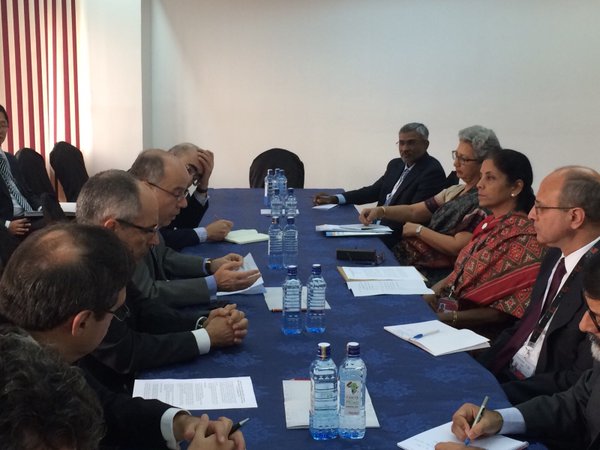
Wealthy countries are still subsidising their farmers at the expense of developing nations, undermining market access for some of the world’s poorest producers, Brazil and India have complained ahead of a key WTO meet in Nairobi.
India has stressed the need for the World Trade Organisation (WTO) member countries to prioritise discussions on the issue of farm subsidies of the rich countries distorting trade.
Trade and Commerce Ministers from the WTO are meeting at the Kenyan capital from December 15-18 for negotiations aimed at a deal to liberalise global trade.
India’s Commerce Minister Nirmala Sitharaman who is heading the Indian team in Nairobi met Brazilian Foreign Minister Mauro Vieira and a host of other delegates from the BRICS country on Monday to discuss common concerns. Sitharaman also stressed on the importance of Special Safeguard Mechanism (SSM) for farmers of developing countries including India and Brazil.
Both Vieira and Sitharaman held separate talks with WTO Director General Roberto Azevedo on Monday.
Brazil’s ambassador to the Group of 20 (G20) Carlos Bicalho Cozendey has said his country will ask developed countries not to raise agricultural subsidies due to the fall of prices for raw materials.
During a meeting of the G-33 group of nations, India has maintained that farm lobbies in the rich world have determined the destiny of poor farmers in India, Brazil and Africa.
Rich countries spend billions of dollars annually on farm subsidies. Farmers from poorer countries say they cannot compete, given these levels of government support for their rivals.
India is insisting that the ongoing Doha Round negotiations must be concluded to remove the disparity in agricultural trade rules tilted in favour of developed countries.
Members of the rich countries club, the Organisation for Economic Cooperation and Development spent a total of $258 billion subsidising agriculture in 2013, OECD data shows.
Both India and Brazil have been forced to use the WTO in their disputes with the United States over farm subsidies.
The topic will resonate with many African countries, some of whom have raised the issue at the UN’s food agency FAO. Wealthy countries are still subsidising their farmers at the expense of developing nations, undermining market access for some of the world’s poorest producers, African Agriculture Ministers have said.
“Our cotton producers are constantly targeted by unfair subsidies from the North. The rules and standards of international trade are not favorable to SMEs (small and medium sized enterprises) from Africa,” Burkina Faso Agriculture Minister Mahama Zoungrana told delegates at a meeting of the FAO in Rome last year.